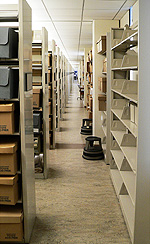Evidence 1 of Competency A
In which I show that I am understand the role of libraries and information professionals in the promotion of intellectual freedom. Text on this page is introduction to the chronology, and below is the link to the full document:
Public Libraries: Last Four Thousand Years [PDF]
This document is in iPaper format, which requires ADOBE FLASH PLAYER to view it. Clicking on [PDF] link, the document will open in ADOBE ACROBAT READER.

Main stacks room
SPECIAL COLLECTIONS and ARCHIVES
Universidty of California, Riverside
Photo Vlasta Radan, 2007.
Need for libraries (and eventually, for librarians) arose with development of high civilizations in Mesopotamia and Nil Valley. The first, as well as many subsequent, state libraries grew from the insatiable need of state to collect, catalog and retrieve large amounts of data with which it controls the lives of its subjects. The biggest and the best funded were, and still are, the government libraries. However, their main concerns are collecting official documents and not serving the wider public.
The libraries associated with schools or universities prospered mainly due to scholarly devotions of its members. The Cinderellas of this story are the public libraries. What is unique to many public libraries is that their existence relied almost exclusively on the good will and philanthropy of private citizens. Their survival was somewhere between the passionate enthusiasm of a few and indifference of many. But, if we use the famous Alexandria library as an example, neglect of public education and resticted access to the knowledge have tragic consequences for the knowledge itself:
"… there is no record… that any of its illustrious scientists and scholars ever seriously challenged the political, economic and religious assumptions of their society. The permanence of the stars was questioned; the justice of slavery was not. Science and learning in general were the preserve of a privileged few. The vast population of the city had not the vaguest notion of the great discoveries taking place within the Library. New findings were not explained or popularized. The research benefited them little. Discoveries in mechanics and steam technology were applied mainly to the perfection of weapons, the encouragement of superstition, the amusement of kings. The scientists never grasped the potential of machines to free people. The great intellectual achievements of antiquity had few immediate practical applications Science never captured the imagination of the multitude. There was no counterbalance to stagnation, to pessimism, to the most abject surrenders to mysticism. When, at long last, the mob come to burn the Library down, there was nobody to stop them." (Sagan 1980, p. 335)
Reference:
Sagan, C. (1980). Cosmos. New York: Random House, Inc.
This web site was developed to satisfy the graduation requirements for
the School for Library and Information Science at San Jose State University California
Text, design, and digital imaging by Vlasta Radan